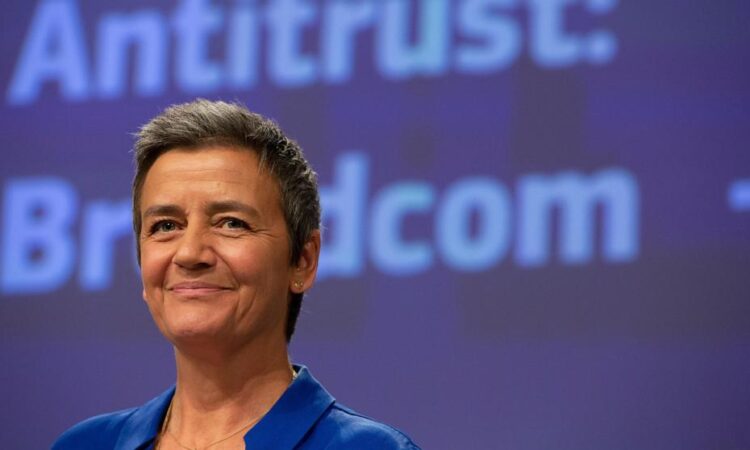
The European Union’s powerful antitrust chief has withdrawn as a candidate for the presidency of the European Investment Bank
COPENHAGEN, Denmark — The European Union’s powerful antitrust chief has withdrawn as a candidate for the presidency of the European Investment Bank, the Danish government said Friday after EU finance ministers gave their support to someone else.
Margrethe Vestager, who took unpaid leave in September to pursue the bank job, plans to return to her role at the EU’s executive commission for a few months, the government in Copenhagen said. The new president of the EIB, the 27-nation bloc’s development bank, is set to begin a six-year term on Jan. 1.
“Out of respect for the further process, the government, together with Margrethe Vestager, has decided to withdraw the Danish candidature,” Denmark’s government said.
EU finance ministers agreed Friday to back Spain‘s economy minister, Nadia Calviño, becoming the bank’s next president. Calviño, 55, said that under her leadership, the bank “will have an even more important role going forward to fund the green transition, to provide financial support to the rebuilding of Ukraine, and also support the role of Europe in the world.”
She would succeed Werner Hoyer, a German whose second mandate as EIB chief ends Dec. 31. Her candidacy still requires approval from the bank’s board of directors and board of governors.
Calviño worked for the European Commission for two years until 2018, when Spanish Prime Minister Pedro Sánchez chose her as his economy minister. She eventually because Spain’s deputy prime minister. She is credited with helping Spain weather the coronavirus pandemic and the global surge in inflation made worse by Russia’s invasion of Ukraine.
“Although we would have liked to see a different outcome, we are satisfied that there is now a clarification of the process,” Danish Business Minister Morten Bødskov said.
Vestager is arguably one of the world’s most important tech regulators. She slapped Google with multibillion-dollar antitrust penalties, ordered Apple and Amazon to pay back taxes and fined Facebook over its WhatsApp acquisition.
Such flagship enforcement cases struck fear in Silicon Valley and drew attention in Washington. Vestager also took on Starbucks and McDonald’s, and looked into Nike’s tax arrangements. Other targets have included Italian automaker Fiat and Russian gas giant Gazprom.
She confirmed her return to the European Commission, which polices EU laws and negotiates trade on behalf of member countries, in a post on X, formerly known as Twitter.
Vestager, who is a vice president of the executive commission as well as commissioner for competition, said she had wanted to reform the European Investment Bank bank by “making it more strategic, faster and more relevant.”
The mandate of the present European Commission expires next year. Elections across the 27 member nations are scheduled for June 6-9.
——
Joseph Wilson in Barcelona, Spain, and Lorne Cook in Brussels contributed to this report.






